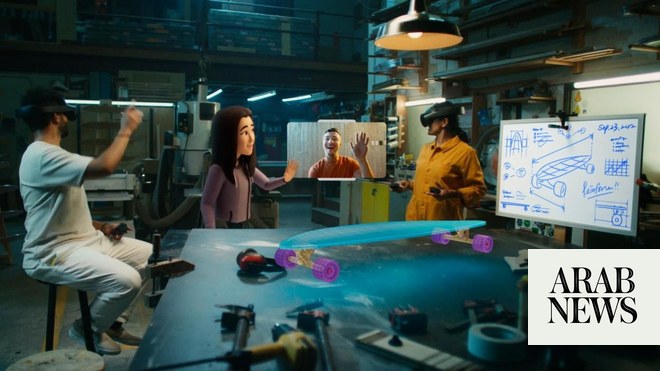
Deloitte study examines potential of cyberspace for MENA region
The metaverse could contribute more than $80 billion to the MENA region in additional GDP a year by 2035, according to Deloitte’s new report, “The Metaverse and its potential for MENA.”
Part of a series of reports commissioned by Meta, the study examines how the metaverse and technologies such as augmented reality and virtual reality are being applied in innovative ways and what is required to maximize potential economic opportunities.
“The metaverse will be a constellation of technologies, platforms and products built by a range of companies, opening up incredible new creative and commercial opportunities in the Middle East and North Africa and around the world,” said Fares Akkad, regional director for the Middle East and Africa at Meta.
Saudi Arabia and the UAE, with their “Vision 2030” and “We the UAE 2031” plans, are taking the lead, reflecting the region’s varied growth plan with digitization at its core.
The government of Saudi Arabia’s spending on technology is the highest in the world, with 21.7 percent of the total technical spending, said Ahmed Mohammed Al-Suwaiyan, governor of the Digital Government Authority, during the Global Entrepreneurship Congress in Riyadh last year.
Similarly, Egypt’s Vision 2030, Jordan’s Vision 2025 and Morocco’s Horizon 2025 plans are all aimed at boosting growth in the country driven by digital transformation.
The study suggests that the emergence of the metaverse could well support MENA countries’ digital innovation and technology objectives.
The two leading countries in the region have already made significant investments in this area: Saudi Arabia is investing $1 billion in cyberspace-related projects and Dubai has launched a metaverse strategy, aiming to “turn Dubai into one of the world’s top 10 metaverse economies.”
As interest in and adoption of the metaverse increases across the region, commercial-use cases have already begun to emerge — such as for virtual concerts and tourism — showcasing how consumers could benefit from the technology.
The full potential for the region will develop as cyberspace evolves, but currently there are four key areas highlighted in the report where the metaverse has and will continue to have an impact: gaming, tourism, retail and real estate.
MENA has one of the fastest-growing gaming industries in the world and Saudi Arabia is investing nearly $40 billion in the sector, according to the study. The metaverse is expected to accelerate this growth through new forms of augmented reality and virtual reality gaming and e-sports.
Tourism, which represents 19 percent of GDP in Jordan, 12 percent in Egypt and 11 percent in Morocco, is a sector that could benefit from the metaverse’s power to provide a virtual experience to potential tourists, piquing their interest in the physical experience.
For example, the Royal Commission for AlUla has created a metaverse experience that allows users to virtually visit and experience the Hegra World Heritage site, the Tomb of Lihyan.
The MENA’s retail industry is worth 1 trillion, and since the pandemic a massive 73 percent of consumers are shopping more online. The growth of e-commerce presents opportunities for retailers to enhance the online shopping experience through augmented reality and virtual reality that can make the challenges of shopping online — such as try-ons — easier.
IKEA, for example, created a virtual reality experience in Kuwait, Jordan and Morocco that led to a 20 percent increase in footfall and sales, according to the company.
The real-estate sector, which is critical for hubs such as Dubai, could see further growth by implementing virtual viewings and creating new marketplaces for virtual land.
UAE-based real estate developer DAMAC, for example, offers augmented reality and virtual reality tours and is planning to invest $100 million in digital cities.
The cyberspace ecosystem is still in its nascent stages and its full potential will depend on “an enabling environment beyond Internet service providers, including adequate digital infrastructure, digital skills and regulations to attract investment, foster innovation and facilitate access to metaverse applications,” according to the report.
More advanced countries such as Saudi Arabia and the UAE are likely to see widespread adoption sooner; however, further diversification will be needed to create “a dynamic private-sector business environment with incentives for innovation and investment,” the study said.
Countries such as Egypt, Jordan and Morocco are likely to see a slower rate of adoption due to disparities in digital infrastructure, skills and affordability, which hinder the implementation of advanced technologies and the emergence of innovative-use cases.
Based on projections of metaverse‑related information and communications technology investments globally, the study estimated that metaverse technologies could eventually support an annual economic contribution ranging from $20.2 to $38.1 billion in Saudi Arabia, $11.6 to $22 billion in Egypt, $8.8 to $16.6 billion in the UAE, $2.6 to $5 billion in Morocco, and $0.9 to $ 1.7 billion in Jordan, by 2035.
Meta’s Akkad said: “As this research shows, while these technologies may be virtual, their economic impact will be very real.”
“Unlocking this potential is critically important and will only be achieved collaboratively, through effort and cooperation between technology companies, policymakers, civil society and others.”












